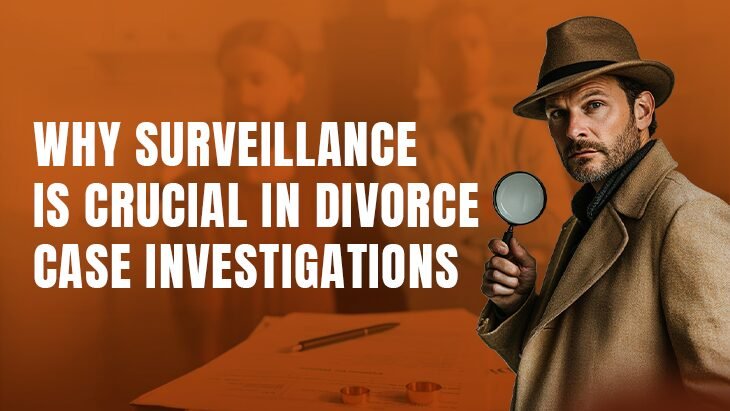Divorce is a life-changing journey that is frequently fraught with emotional upheaval, intricate legalities, and conflicts that necessitate substantial proof to overcome. In these situations, evidence can mean the difference between a fair settlement and a disastrous legal outcome. Divorce case investigations proceeding might contain issues such as adultery, child custody conflicts, or hidden assets, all of which require solid evidence to back up claims presented in court.
Surveillance is a valuable method for obtaining this critical evidence. It enables legal experts and citizens to unearth hidden truths and present concrete facts in court. This blog will look at the role of surveillance in divorce investigations, the various types of surveillance tactics, and how they can influence divorce cases’ outcomes.
The goal of this blog is to demonstrate how surveillance plays an important role in acquiring evidence for divorce proceedings, preserving legal rights, and achieving a fair decision in court. Surveillance is critical for developing a compelling case, whether it’s capturing a cheating spouse, protecting a child’s best interests, or discovering hidden assets.
The Role of Surveillance in Divorce Case Investigations
What exactly is surveillance when it comes to divorce?
In divorce investigations, surveillance involves observing and monitoring one spouse’s behavior in order to gather evidence for legal proceedings. It frequently focuses on behaviors that may influence the outcome of a divorce, such as infidelity, child maltreatment, or financial fraud. The fundamental goal of surveillance is to obtain objective and admissible evidence to back up claims made during divorce proceedings.
Types of Surveillance
- Physical surveillance entails observing a spouse’s bodily motions and interactions. Private investigators may follow the subject and chronicle their movements, interactions, and conduct via photographs, videos, or written reports.
- Digital Surveillance: Today, we store most of our personal information online. One type of digital surveillance involves monitoring emails, social media activity, or online communication for evidence of infidelity or other misconduct.
- Financial surveillance: Financial data and transactions can disclose concealed assets or income. Financial surveillance may include monitoring bank accounts, investments, and other financial activity to detect anomalies in reported assets or earnings.
Legal Issues and Privacy Laws
Privacy rules govern surveillance, even though it can yield useful evidence. Unauthorized or unlawful surveillance measures, such as hacking into private accounts or bugging residences, may result in criminal charges or inadmissible evidence. To ensure legal monitoring, it is crucial to hire a licensed and skilled investigator. Investigators must adhere to privacy rules, which restrict what they can and cannot observe without consent in private locations like houses.
3. Types of Divorce Cases in Which Surveillance is Required
Infidelity Investigations
Infidelity is one of the most popular grounds for seeking surveillance during a divorce. Proving adultery has implications for both alimony and asset division. Some countries may reduce or eliminate the other party’s alimony if a spouse can demonstrate infidelity.
Examples of physical and digital surveillance for infidelity are as follows:
- Physical surveillance could include following a cheating spouse and documenting encounters with a third party.
- Monitoring suspected social media activity, such as covert chats or online dating profiles, is one method of digital surveillance.
Child custody disputes
In child custody cases, the court always prioritizes the child’s well-being. Surveillance can be useful in monitoring a parent’s conduct to ensure they are providing a secure and stable environment. Evidence of maltreatment, substance abuse, or association with hazardous individuals can have a substantial impact on custody decisions.
Using Surveillance to Prove Neglect or Hazardous Conditions:
- Surveillance can reveal a parent’s substance misuse, irresponsible driving, or involvement with dangerous situations.
- It can also track who the parent leaves the child with, indicating neglect or inadequate care.
Hidden Asset Investigations
Divorce proceedings sometimes entail the separation of financial assets; nevertheless, some spouses may seek to conceal or underreport their income or assets in order to prevent equitable distribution. Financial surveillance helps track these hidden riches and ensures equitable distribution.
- Forensic financial surveillance:Forensic accountants can examine financial records, bank statements, and corporate transactions to identify concealed income, offshore accounts, or undisclosed investments.
Advantages of Surveillance in Divorce Case Investigations
Gathering Concrete Evidence
Surveillance offers unequivocal evidence of misbehavior. Courts can use photographs, films, and digital documents as evidence. Tangible evidence in divorce disputes could make the difference between taking accusations seriously and dismissing them for lack of proof.
Influencing Court Decisions
In matters involving child custody or financial issues, the court takes the provided evidence seriously. Surveillance evidence can influence the judge’s decision on matters such as custody, alimony, and asset split. For example, demonstrating a parent’s reckless behavior or a spouse’s hidden assets can result in more favorable decisions.
Protecting Legal Rights
Surveillance can also prevent false allegations. In high-conflict divorces, one side may charge the other with infidelity, neglect, or abuse. Surveillance can help gather evidence to disprove these claims and safeguard wrongly accused people from harmful judicial outcomes.
Uncovering the Truth in Complex Cases
Divorces with large assets or significant disputes can be quite difficult. Surveillance aids in the discovery of the truth when one side seeks to manipulate the situation, conceal their activities, or create a false narrative to gain an advantage.
How Surveillance Works in Practice
Step-by-step Analysis of a Surveillance Operation
- Initial Consultation: The investigator will visit with the client to learn about their needs and collect pertinent information, such as accusations of adultery, financial disparities, or worries about kid safety.
- The investigator develops a surveillance plan based on the information provided. This includes determining the best places, times, and surveillance tactics for gathering the most relevant information.
- Surveillance: The investigator monitors the subject, either physically or digitally. They may follow the suspect, track their vehicle with GPS, or monitor internet communication.
- Reporting Findings: The investigator puts all obtained evidence, such as photographs, videos, money records, or other documented activity, into a detailed report that may be presented in court.
Private investigators use tools and technology
GPS Tracking: You can use GPS devices to track and record a subject’s vehicle movements.
Hidden cameras record video footage of exchanges and behaviors.
Investigators can use specialized software to monitor online activity such as social media, emails, and browsing history.
Common Challenges that Investigators Face
Surveillance might be difficult due to the possibility of detection or legal limits. To avoid violating privacy regulations and jeopardizing the case, investigators must be subtle and act within legal limitations. Additionally, some subjects may be aware of surveillance and take precautions to avoid detection.
Legal and Ethical Considerations for Divorce Case Surveillance
Privacy Laws and Surveillance
Each state has its own privacy rules that dictate what forms of surveillance are permissible. For example, most states prohibit recording conversations without both participants’ consent. Violating these laws could result in criminal penalties and the exclusion of evidence in court.
Importance of Hiring Licensed Investigators
Employing a qualified investigator ensures the lawful and ethical execution of monitoring procedures. Licensed investigators are familiar with state legislation and how to gather admissible evidence. They can also testify about their findings in court, supporting the case.
Risks of DIY Surveillance
Attempting to conduct surveillance on your own is perilous. It may violate privacy regulations, produce erroneous or insufficient evidence, and, in some situations, result in legal consequences. Without the necessary skills, techniques, and legal awareness, DIY surveillance is frequently more damaging than beneficial.
Key Considerations Before Hiring a Surveillance Investigator
What Should You Look for in a Private Investigator for Divorce Case Investigations?
Choosing the correct private investigator is critical to the effectiveness of your surveillance operations. Here are some crucial variables to consider:
- Certifications and Licensing: Make sure that the private investigator is licensed and certified in your state. This ensures they follow legal and ethical norms, which are critical for ensuring that any evidence gathered is admissible in court.
- Experience and Expertise: Look for investigators that have specific experience managing divorce disputes. Experience in the industry guarantees that they understand the complexities of acquiring evidence for adultery, child custody, or financial issues.
- Reputation: Look into the investigator’s reputation by reading reviews, reviewing testimonies, and asking for referrals. A respectable investigator would have received excellent feedback from previous clients and had a track record of successful investigations.
- Transparency: Hire an investigator who is open about their procedures, fees, and expected results. This transparency promotes confidence and ensures that you are aware of what to expect during the process.
- Communication Skills: Clear communication is crucial. The investigator should be able to explain their methods, provide regular updates, and answer any concerns you have concerning the surveillance process.
Costs and Budgets
The cost of engaging a private investigator varies greatly depending on the scope and duration of the surveillance. Here are some elements that influence the cost:
- Complexity: Complex cases, such as those involving multiple subjects or significant financial investigations, are typically more expensive.
- Surveillance Duration: The cost increases with the length of the surveillance time. Investigators charge based on the amount of hours spent on each case; thus, longer investigations will result in a higher total fee.
- Surveillance Types: The cost structures for various types of surveillance, such as physical tracking, digital monitoring, and financial investigations, may differ.
- Investigator skill: Although more experienced investigators may charge greater fees, their skill can frequently result in more effective and accurate evidence.
It is critical to discuss the budget with the investigator beforehand and reach an agreement on costs and payment arrangements.
Timeframe
Surveillance can be time-consuming, and the timeline for acquiring evidence varies depending on the circumstances of the case. Here are some considerations.
- Case Complexity: Simple situations can be settled in a few days, whereas complex cases that require lengthy monitoring or deep financial analysis might take weeks or even months.
- Evidence Collection: The subject’s behavior and the specifics of the case determine how long it takes to gather sufficient evidence. For example, reporting infidelity may take less time than discovering hidden riches.
- Reporting and Analysis: After gathering evidence, the investigator must take time to compile and analyze the results. The final report may require additional time to prepare.
Patience is required during the surveillance procedure. Rushing the investigation may result in incomplete or inadequate evidence; thus, it is critical to provide the investigator with enough time to collect thorough and accurate information.
Conclusion
Surveillance is an important technique in divorce case investigations, as it allows for the collection of objective and indisputable evidence. Surveillance, whether dealing with infidelity, child custody, or hidden assets, helps to develop a solid case and ensures a fair outcome. Surveillance is critical for influencing court judgments and defending legal rights because it provides real evidence and reveals hidden truths.
If you are dealing with a complex divorce case, consider talking with legal professionals and seasoned investigators who can help you navigate the process and get a fair resolution.
If you require skilled surveillance services to support your divorce case investigations, contact the Advance Detective Agency – the best detective agency in Delhi, NCR right away.
Frequently Asked Questions
1. Is surveillance legal in every state?
Surveillance is generally legal if it does not breach privacy laws. Not all states permit certain methods of monitoring, such as audio recording or placing a tracking device on a spouse’s vehicle. Always consult with your attorney before beginning monitoring.
2. How much does monitoring usually cost in a divorce case?
Costs vary according to the complexity of the case and the amount of time required for investigation. Surveillance fees can range from $50 to $200 per hour, depending on the investigator’s experience and location.
3. Can surveillance aid with child custody battles?
Yes, surveillance can reveal evidence of a spouse’s unsuitable behavior or neglect, influencing custody choices in court. Documented proof of dangerous activities, such as substance addiction, can help to ensure the child’s well-being.
4. What happens if the subject of the surveillance becomes aware of it?
If the person becomes aware of the surveillance, it could potentially jeopardize the inquiry. Recruiting experienced investigators trained to conduct covert operations without detection is crucial.



